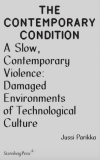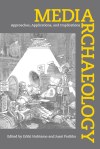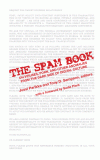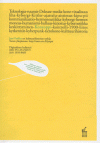#code2k12
I am not the most qualified person to analyse the political economy and at times slightly exaggerated role of conferences; I do not really too often go to the big ones where the whole system of recruitment and other sort of social/affective work of academia happens. I am sure there are loads of management books on such topics and their importance. Not that I have anything against being social – just being a Finn you have to limit it a bit, not to get exhausted with the overwhelming number of people that would amount to the total number of a small Finnish village easily. However, at times events really strike a chord – like Code at the Swinburne University of Technology, Melbourne: a fantastic combination of academic quality and lovely people.
I am a firm believer in that the more interesting academic benefit of such events is not hearing someone speak, but that you are able to meet and talk outside the sessions; whether casual chattering or on the topic of the presentation. This is hardly a surprise. But it is not only the meet & greet networking silly management culture that we are persuaded to pursue, but actually having some affective pleasure from finding out that academics are not completely subsumed into corporate climb-the-ladder assholism.
Of course, talks can be really good in triggering ideas. What I mean by that is at least my own prespective that I have often trouble in immediately summarizing someone’s talk in its entirety, and instead I get nuggets, something that triggers an idea. In this sense as well, Code was a success.
The event was not focused down solely on software culture or critical code studies despite the frequent references to Chun, Galloway and Kittler – and some other usual suspects. I perceived something of an expanded notion of code in the sense that through the theme, a lot of presentations pointed to a broader context of materialities in which code takes place; logistics, management, intermedial relations, aesthetic, and non-computer placed coding of social actions/events like with the Human Fax Machine-experiment. Talks ranged from reddit to Ring(u), cars to Erica T. Carter, commandline to Google, and signal to Simondon. Code had already introduced its own approach to the idea even with a conference reading list!
Besides having the pleasure of listening to the fantastic keynotes by Anna Munster and Christian McCrea, for instance the plenary panel of Melissa Gregg, Ned Rossiter, Soenke Zehle and Mark Coté was the best one can hope for. Brilliant speakers all of whose I work admire a lot, and the topics were nicely resonating. For instance Gregg’s take on the Getting Things Done (GTD) software was something that illuminates what I tried to just briefly address in my own keynote on Cultural Techniques of Cognitive Capitalism (more on that later in a separate blog post): the entanglement of media, management, affect and modes of production in contemporary digital culture. Such practices, techniques and technologies frame the will for more time and freedom, as well as creativity, which ground notions such as cognitive capitalism, and in Gregg’s case she was able to show the deep layers of such ideas of “work smarter, not harder”. Exhaustion, tiredness and fatigue have not disappeared from the gendered worlds of management of office and post-office work. Such affect management and self control are excellent ways of articulating the curious emphasis on the cognitive and affective in relation to modes of production: they hover somewhere between of the tiring and energizing, of repetitive and creative. In this context, see also the Zooming Secretary game that Gregg started with — filing cabinets, telephones and coffee boosts; affective attunement.
It was also pleasure to hear Coté talk of his book project on Data Motility which is one of those great moments when we get someone with a fantastic knowledge of Italian political theory and current media theory talking about a topic of Digital Humanities. DH at times “forgets” the existence of media theory, as well as the longer history of humanities-technology partnering, but at the same time of course we need to be ready to update our theoretical perspectives in relation to new modes of quantities, qualities, and abstractions.
Coté ‘s book promises to be really exciting, offering an insight to data having a self-generated sense of movement as well as being the object of value creation: big social data is the sociality of the data for instance collected on social media, which highlights its polyvalence and social and economic valorisation. According to Coté big social data can be seen constituting a certain mode of humanness that humanities should tackle with. This sort of conditioning is the sort you get from the directions of Leroi-Gourhan and others. But it also points to the direction of debt, an interesting idea Coté suggests: what if we understand our relation with the data collected as one of debt, as analysed by for instance Lazzarato. Big social data in social media contexts is one of endless payments and demands of creating the social through actions, in order to justify our existence.
Both Rossiter and Zehle talked of logistics; Rossiter towards the worlds of media and management, transposition of labour to code & algorithms (which probably would resonate with some insights from Fuller & Goffey’s recent Evil Media) and Zehle in relation to gestures. Indeed, listening the two talks in the same panel made the audience aware of the multiscalar worlds of logistics – from human social affect and gestures, to the abstracted worlds of simulations and games in which management and logistics can be rehearsed.
Even if I mention only some of the papers here, throughout the conference I felt more inspired than in most of the events I visit. As said, this extends to the time outside the actual talks; people are engaged in several interesting projects, which made me actually, and without irony, feel rather ok about being an academic. And in that context, it was less painful to visit the other side of the world, Melbourne, and do two long haul flights within 10 days. I myself talked about some new things I am engaged in – a sort of a project pitch for something that might turn out to be a bigger project event – and gave a “master class” on Media Archaeology & Cultural Techniques.
-
December 3, 2012 at 1:57 amTwitter and academic professionalism – for Pre-Fix at #CSAA2012 | Restless Capital


















